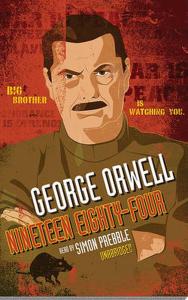Title: Nineteen Eighty-Four
Author: George Orwell
Genre: Classic/Dystopian
Trigger Warnings: Torture (graphic), abuse (graphic), brainwashing (graphic), violence, antisemitism, sexual content, rape (mentions)
Back Cover:
In the year 1984, much of the world has fallen victim to perpetual war, omnipresent government surveillance, historical negationism, and propaganda. Great Britain, known as Airstrip One, has become a province of a totalitarian superstate named Oceania that is ruled by the Party who employ the Thought Police to persecute individuality and independent thinking. Big Brother, the dictatorial leader of Oceania, enjoys an intense cult of personality, manufactured by the party’s excessive brainwashing techniques. The protagonist, Winston Smith, is a diligent and skillful rank-and-file worker and Outer Party member who secretly hates the Party and dreams of rebellion. He enters into a forbidden relationship with a colleague, Julia, and starts to remember what life was like before the Party came to power.
Review:
I first read Nineteen Eighty-Four in high school. Being homeschooled, there wasn’t any discussion or context for it, my mother just handed me a list of classic books she read in high school English and told me to have at it. I remember very few of the books I read off that list, but I do remember I hated Nineteen Eighty-Four. Absolutely loathed it. I read a lot of dystopian back then, but it was young adult dystopian (riding on the success of The Hunger Games and mostly following the same formula) where there were rebellions and the heroic protagonists overthrew the evil government by the end of the trilogy. A dystopian book where the protagonist wasn’t “good” and the evil government won was inconceivable to me. Plus there was sex in this, and I was very much not comfortable with that.
I picked it up again because I read Brave New World, another classic dystopian written about a decade before this book, and I wanted to compare the two. I didn’t end up doing a lot of comparing, though, because I was reexperiencing the story. With the benefits of having enough adult awareness to see the many ways the world is screwed up (and the maturity to not immediately throw the book in the “not suitable for Good Christian Readers” pile the instant sex is mentioned), I was able to read it in a whole new light.
From endless wars where the enemy changes but the demand for patriotism doesn’t to constant government surveillance to strong stratification between upper and lower classes, much of this book maps directly onto my modern experience. The Party has a distinctly communist feel, but I don’t know if that’s because George Orwell actually feared the oppression would come from communism or because he just took a lot of imagery and ideas from the Soviet Union for the Party. (Wikipedia suggests he opposed totalitarianism in all forms, not specifically communism.) I found the telescreens used to both broadcast and spy highly ironic, because I’m pretty sure TVs don’t have the technology to broadcast our actions or words back to anyone but our phones sure do and we voluntarily take them everywhere.
You can read this as an interesting dystopian with elements of current reality, or you can let it make you really depressed. I went back and forth on how I was experiencing it. But I finally understand why this is a book people make high schoolers read.
Since this is a reread, this review has more been about my changing understanding of the book than the book itself. It is well written, with a solid world dominated by a totalitarian government, a fairly unlikeable narrator that you manage to root for anyway and a fairly unlikeable love interest who is nevertheless relatable, and a really horrifying amount of brainwashing torture that spans roughly the last third of the book. It’s quite good, and shockingly prescient considering it was published 72 years ago. I don’t think it’s one that I’ll reread repeatedly, but reading it again with adult eyes was definitely worthwhile.

